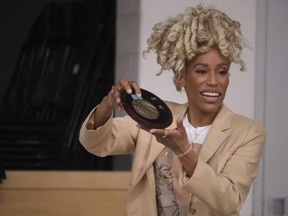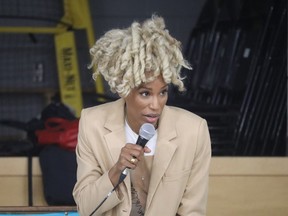
After many years as an athlete, Canadian Olympic medal winner Phylicia George says she now thinks of herself as a storyteller.
Advertisement 2
Article content
George told pupils at PE McGibbon elementary school in Sarnia her story of competing at the summer Olympics as a runner and then the winter Olympics as a bobsledder.
Article content
The motivational speaker was in Sarnia Feb. 15 to take part in an event at the Imperial site in Sarnia and the company arranged for her to also speak to pupils at its partner school in the city.
Toronto-born George began running hurdles at age 15 and competed at the London 2012 and Rio 2016 Olympics.
After that, she was recruited to compete in bobsled and won bronze with Kaillie Humphries at the 2018 Olympics in South Korea.
George said she was the fastest runner at her elementary school in Markham and remembers being nine years old and watching on television when sprinter Donovan Bailey won gold at the 1996 Olympics.
Advertisement 3
Article content
“I remember thinking to myself, these runners. . . are superheroes,” she said. “And I made the decision that day to become a superhero.”
George said that taught to her to “pay attention to the things that make you excited.”
Goals she set for herself early on were to earn an athletic scholarship and become an Olympian.
George graduated from the University of Connecticut with a science degree and spent several years as a professional track and field athlete before retiring.

“You’ve got to go after your dreams and be willing to dedicate yourself,” she told pupils gathered in the school gym.
George said she was 15 and in a car with her father driving by a Toronto track and field club when she asked if they could stop in and see if she could find a coach.
Advertisement 4
Article content
“That day I joined the track club and I started training five days a week,” taking a two-hour bus ride each day to reach the club, she said.
It’s important to “dream big,” George told the pupils.
“Don’t be afraid to dream bigger than what other people think you might be able to accomplish,” she said.
George also told them to be willing to bet on themselves.
When she graduated from university, many people advised her to leave track and field.
“But there was a fire inside of me that really believed” her Olympic goals could come true and she continued on as a track athlete, she said.
“Consistency is key,” and she began training six days a week, George told the pupils.
“Being a superhero is being really good at doing things over, and over and over again” and “learning how to do all the little things very consistently,” she said.
Advertisement 5
Article content
Preparation leads to confidence, George said.
“One of my favorite moments in track and field is walking to the starting line” and “the anticipation of going out there and showing the world what I have,” she said.
George compared it to going into at test at school with confidence you’ve done all you can to prepare.
But she said she also learned during her career that things don’t always go as planned, and “that’s an opportunity to show yourself your superpowers.”
George said she had an injury in 2013 after finishing fifth in the Olympics hurdles finals.
“I remember feeling so sad because I thought, ‘this is obviously the end of my career.’”
Instead, she began to see it as an opportunity and realized that “being a superhero is making the decision to continue when things get challenging,” George said.
Advertisement 6
Article content
After eight months of rehabilitation, she won her first national championship the year she returned to competition.
George told the pupils she wanted to leave them with the idea that a superhero “is someone who believes in themselves,” is “willing to take action to get better” and “keeps going when things are challenging.”
It’s also someone who shares their joy with others, she said.
“Based on that, we can all be superheroes,” George said.
Imperial spokesperson Kristina Zimmer said George was at the Sarnia manufacturing site for a Black history month event with her employees and the company also arranged for her to speak at PE McGibbon, a city elementary school not far from the Imperial site.
“We thought the kids would really benefit from a role model like this,” Zimmer said.
The company’s partnership with the school includes staff helping with its breakfast program, supporting its recent Christmas dinner, arranging a visit by retired Sarnia astronaut Chris Hadfield a few years ago and other activities.
“This is an awesome school.” she said.
Article content
